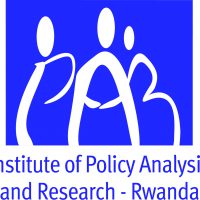First Review of East African Biodiversity Informatics Policies
Institute of Policy Analysis and Research – Rwanda (2014)
Biodiversity Informatics Policy Research
Project Details
Project News
Last Updated: August 17th, 2020
Background
A historical review of the history of the field of biodiversity informatics reveals a story of great progress in mobilizing biodiversity data, developing international standards and tools, creating infrastructure of information management systems, and building institutional capacity and information-sharing initiatives. However, most success in this field has been achieved in developed countries, whereas little is known about the status of progress in developing areas such as sub-Saharan Africa. The Institute of Policy Analysis and Research (IPAR)-Rwanda is a nonprofit think tank focused on providing analysis and research to inform policy makers in Rwanda and the region. The aim of this project is to identify, document, and assess policies, legal frameworks, and cultural and technical factors in the region that relate to biodiversity informatics. This includes those that promote or hinder biodiversity data generation and sharing in sub-Saharan Africa, govern data standards and infrastructure, influence the development of information systems and infrastructure, and facilitate or block open access and use of biodiversity knowledge and data.
Key Objectives and Activities
This study will review and describe the current policy framework relating to biodiversity informatics. The team will identify stakeholders and conduct a literature review and content analysis to understand the key organizations, policies, and strategies affecting biodiversity informatics. The project will also provide an initial evaluation of these policies, focusing on the three criteria. First, they will determine what policies exist related to: (1) Mobilizing Biodiversity Data, (2) Standards, Protocols, and Tools development, (3) Informatics Infrastructure development and (4) Capacity Building, Outreach and Open Access Initiatives. Second, they will evaluate whether these policies concise and easily understood. Finally, they will describe to what extent there a clear division of responsibilities, powers and tasks in implementing, monitoring, inspecting biodiversity information of various agencies and stakeholders involved (including government institutions, NGOs, CBOs, citizens, etc.).
Planned Outputs
- Publication of peer-reviewed journal articles and policy briefs.
- Presentation of results at workshops and conferences.
- Email and web-based newsletter updates.
Planned Outcomes
IPAR-Rwanda aims to reach, inform, and influence researchers in related fields, policy makers, and development officials who have an interest in or ability to promote biodiversity and biodiversity informatics in sub-Saharan Africa. These stakeholders will have better knowledge about existing policy frameworks, systems, and institutions that influence the use and value of biodiversity information, gain an appreciation for the similarities and differences among nations and regions with respect to this policy area, and will receive and utilize guidance about best practices for promoting the generation, use, and sharing of biodiversity information.
Results To Date
- The 6th IPAR-Rwanda Annual Research Conference was held March, 2017 in Kigali, Rwanda. The conference brought together over 100 participants from government, academia, and the media in order to discuss issues relating to securing biodiversity and ensuring sustainable management and development of Rwanda’s natural resources.
- Peer reviewed publications (below) have shared findings regarding regional policy contexts for access to biodiversity information and the development of biodiversity informatics.
Related Publications
- Tsinda, A; R Mugisha; L Mutesi; A Bizoza; P Abbott. (2016) Biodiversity Informatics in Eastern Africa. The African Technopolitan. 5: 72 – 77 (download here).
- Tsinda, A; R Mugisha, L Mutesi; A Bizoza; E Kayitesi, P Abbott. (2016) Biodiversity informatics in Eastern Africa: Status drivers and barriers. Journal for Nature Conservation. 32: 67 – 80. (link)
Project Director Biography
Aime Tsinda is a Senior Research Fellow at the Institute of Policy Analysis and Research, IPAR-Rwanda. He holds a B.Sc. in Geography, an M.Sc. in Urban Planning from the Université de Montréal in Canada and a Ph.D. in Environmental Strategy from University of Surrey (UK). He has extensive experience in research, academia and policy relevance to environment. In 2005 (November), he was an Assistant Lecturer at Kigali Institute of Education in the Department of Geography (Physical Geography) and later lectured in the same institute. He has published two books, and several articles in peer-reviewed international journals.
Notes from JRS
Policy research like this is a new area of grantmaking for JRS, with the aim of better understanding the policy and decision-making context surrounding technical efforts related to biodiversity data and information in the regions where we work. JRS is interested in supporting this work in order to:
- Generate greater interest among policy researchers in the topic of biodiversity informatics.
- Allow JRS and other funders to make wise investments in biodiversity data with greater information about enabling context and institutions.
- Help countries learn from each other about effective regulation and use of biodiversity information.
This investment was one of several efforts funded by JRS including grants to the African Technology Policy Studies Network and Conservation International that aim to enrich the understanding of the interplay among public policy, access to biodiversity data, and decision-making. We also hope that this work will inform and intersect with the effort by the South African National Biodiversity Institute aimed at mobilizing South Africa’s biodiversity data.
Dr. Tsinda’s excellent work confirmed the lack of coherence at national levels among policies that require or use biodiversity information and that there is not an institutional framework in any country explicitly coordinating biodiversity information. JRS is seeking to focus grantmaking in fewer countries to benefit from deeper understanding of national policies. The lack of other research studies on this subject support the discouraging hypothesis that access to biodiversity data and information may not provide an organizing concept for policy research or policy change.
